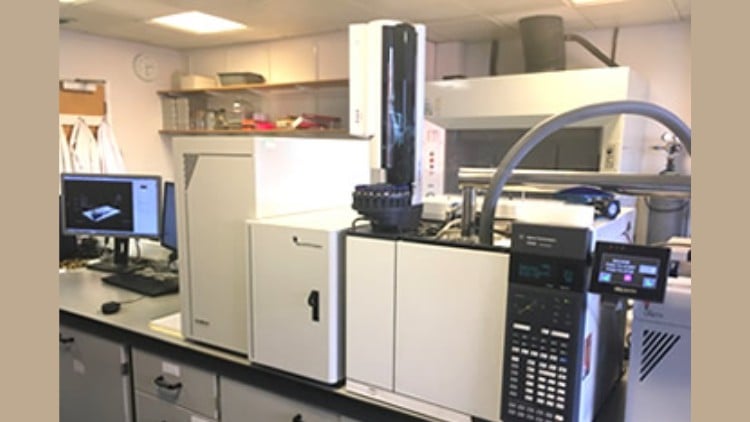
Unlocking the Science of Separation
⏱️ Length: 1.4 total hours
⭐ 3.61/5 rating
👥 2,718 students
🔄 June 2023 update
Add-On Information:
Note➛ Make sure your 𝐔𝐝𝐞𝐦𝐲 cart has only this course you're going to enroll it now, Remove all other courses from the 𝐔𝐝𝐞𝐦𝐲 cart before Enrolling!
-
Course Overview
- This Gas Chromatography (GC) course unlocks the fundamental science behind separating and analyzing volatile compounds. It meticulously explores GC’s powerful ability to isolate individual components from complex mixtures based on their unique physical properties and interactions within a chromatographic column. You’ll gain an in-depth understanding of the entire GC system, from sample injection and vaporization to the sophisticated detection of eluted analytes. The curriculum dissects each critical instrument component – injectors, columns, and detectors – detailing their operational principles and the critical parameters that influence separation efficiency, resolution, and sensitivity. This program is designed to provide you with a robust theoretical foundation, preparing you for advanced analytical challenges and informed troubleshooting in diverse laboratory environments.
-
Requirements / Prerequisites
- No prior GC experience is required, making this an ideal entry point for analytical chemistry.
- A basic comprehension of general and organic chemistry principles, particularly concepts like vapor pressure and intermolecular forces, will aid in understanding separation mechanisms.
- Familiarity with fundamental laboratory safety practices and general scientific terminology is beneficial.
- Stable internet access and a standard computer are necessary to fully engage with the online course materials.
- An inquisitive mind eager to explore advanced analytical techniques and problem-solving will thrive in this course.
-
Skills Covered / Tools Used
- Mastering GC Theory: Understand core principles like retention mechanisms, column efficiency, and the Van Deemter equation.
- Chromatogram Interpretation: Develop expertise in analyzing chromatograms, identifying peaks, evaluating resolution, and accurately quantifying components.
- Instrumentation Insight: Gain comprehensive knowledge of GC system components: various injector types (split/splitless), diverse column chemistries, and common detectors.
- Method Development & Optimization: Learn systematic approaches to designing and optimizing robust GC methods, including temperature programming and carrier gas selection.
- Advanced Sample Preparation: Explore essential techniques like Solid-Phase Microextraction (SPME), headspace analysis, and derivatization for complex sample matrices.
- Troubleshooting Expertise: Acquire practical knowledge for diagnosing and resolving common GC instrument issues such as peak tailing, retention time shifts, and baseline noise.
- Detector Application: Differentiate and apply various GC detectors (FID, TCD, ECD, NPD, FPD), understanding their sensitivity, selectivity, and interface with Mass Spectrometry (GC-MS).
- Data Analysis Fundamentals: Grasp the basics of using chromatography data systems (CDS) for peak integration, calibration, and quantitative reporting.
- Quality Control & Assurance: Understand the importance of internal standards, quality control samples, and validation parameters to ensure method accuracy and precision.
-
Benefits / Outcomes
- Deep GC Comprehension: Achieve a thorough, practical understanding of Gas Chromatography, confidently discussing its theory, instrumentation, and diverse applications.
- Enhanced Analytical Skills: Sharpen your analytical problem-solving abilities, applying GC principles to complex separation and identification challenges.
- Method Development Proficiency: Gain the confidence to design, optimize, and troubleshoot GC methods independently for various analytical scenarios.
- Informed Data Interpretation: Develop advanced skills in interpreting chromatograms, quantifying analytes, and making scientifically sound decisions from analytical data.
- Accelerated Career Growth: Position yourself for advanced roles in analytical chemistry, R&D, quality control, and environmental monitoring, leveraging highly sought-after GC expertise.
- Operational Confidence: Acquire the knowledge to conceptually operate and maintain GC instruments, minimizing downtime and maximizing laboratory efficiency.
-
PROS
- Comprehensive Theoretical Grounding: Offers an extensive and detailed exploration of GC principles, ensuring a strong conceptual foundation.
- Emphasis on Practical Methods: Focuses heavily on method development, optimization, and real-world troubleshooting, directly applicable to laboratory work.
- Structured and Clear Curriculum: Logically organized content facilitates a smooth learning progression from fundamental concepts to advanced techniques.
- Broad Industry Demand: The expertise gained is highly valued across pharmaceuticals, environmental, food, and forensic sciences, enhancing career prospects.
-
CONS
- Limited Physical Hands-On: As an online course, it provides conceptual and simulated learning rather than direct, physical operation of GC instrumentation, which may require supplementary practical experience.
Learning Tracks: English,Teaching & Academics,Science
Found It Free? Share It Fast!